KIEV, Ukraine—The back doors of the black mini-bus open wide to reveal boxes and bags piled high. Each is neatly labeled in Russian, describing the religious, as well as the mundane objects it contains—Machzor prayerbooks for Rosh Hashanah, siddurs for Shabbat, tallises. But there was also kosher wine, dishes, winter clothing, a computer. All of the items—from a giant hot-water machine to a bag of fuzzy blankets—have been retrieved from the embattled eastern city of Donetsk, Ukraine.
In the flickering light of a synagogue courtyard, volunteers begin helping Rabbi Pinchas Vishedski, chief rabbi of Donetsk, and his wife Dina—co-directors of Chabad-Lubavitch of Donetsk—unload the big van’s contents. The vehicle has just traveled nine hours from Donetsk to Kiev, and the boxes contain the very life of the Donetsk Jewish community—a life that was active and secure just six months ago, but is now on the run and spread throughout Ukraine.
With, by all accounts, Donetsk experiencing sustained battles between pro-Russian Donetsk People’s Republic (DPR) separatists and the Ukrainian army, despite a Sept. 5 ceasefire, the city remains far too dangerous a place to return to for the thousands of refugees who call it home.
Today, hundreds of Jewish community members are living in rented or loaned apartments all over Kiev, including the rabbi and his family, with the Vishedskis working frantically to arrange activities for what amounts to a community in exile. Using borrowed space at the Midreshet Zion synagogue in central Kiev, last week the community held its first Shabbat services, drawing more than 30 Donetsk natives.
As Rosh Hashanah approaches on the evening of Sept. 24, the couple is working to ensure that their community is once again able to celebrate the Jewish New Year together, renting space in two hotels for the hundreds of people expected, and preparing meals for the two days of the holiday and the Shabbat that immediately follows.
‘Making Progress’
“We are making progress here, thank G‑d, but still, it’s not our home,” explains Rabbi Vishedski. “In the past, we made two large weddings for our daughters in Donetsk. Each had hundreds of people, and we had to arrange hotels and buses and food for many guests, but even that was easier than this. Everything is much simpler and smoother when it’s in your own city.”

As Dina Vishedski weeds through the variously packed bundles—some of them just bed sheets filled with necessities and tied in a knot at the corners—she reflects: “Imagine you have to send people into your home to pack a few of your things for you? Grabbing whatever they can, whatever will fit? It’s terrible. It’s so terrible and sad.”
Pulling in late Wednesday night, the mini-bus supplies were much appreciated, but underwhelming in the larger scheme of things. It had passed by numerous separatist DPR and opposing Ukrainian army positions, and its driver responds matter-of-factly when questioned about road conditions:
“If fighting begins while you’re on the road,” he reports, “it’s better just to drive through it faster, rather than sit around and wait to get blown up.”
Finishing his cigarette, the driver climbs back into his seat to make the return trip home.
‘Must Remain Safe’
Those who live throughout the former Soviet Union are typically cynical about everything, especially government.
That’s why when a ceasefire agreement was signed in Minsk, Belarus, between Ukrainian President Petro Poroshenko, Russian President Vladimir Putin and DPR representatives, few believed it would last. Relative quiet did descend on the east during the first three days, before ultimately being broken by both sides. Now, the situation remains calmer than it was prior to the ceasefire, but not by much, and no one knows for how long.
Still, even during that short time of quiet, some refugees managed to return to Donetsk, hoping that the peace would somehow actually last.
“I know a number of people who went back there,” says Marina, 36, a Donetsk Jewish community member who now lives with her three sons, sister, brother-in-law and their two children in a two-room apartment in outer Kiev.
Marina’s husband remains in Donetsk, running the small store they own and sending whatever money he makes to his wife. “I wanted to go back, too. I told my husband and he said, ‘Under no circumstances! You and the children must remain safe. There’s still shelling going on here.’
“I don’t think I ever really believed in the ceasefire,” she says softly. “I just wanted to believe in it.”
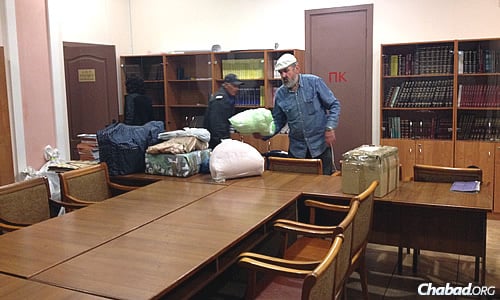
In preparing for Rosh Hashanah, the Vishedskis are now gearing up for two sets of holiday services—one in Kiev for refugees, the other in Donetsk for those who never left and those who have since returned. When Machzors arrived in Kiev, it was only half of the community’s supply, the other half remaining for use in Donetsk. Depending on reports from the city, two Chabad emissaries may even be sent to lead the services and blow shofar for Rosh Hashanah.
‘We Just Want to Go Home’
Sitting around their small kitchen table, which, together with a few chairs and mismatched mattresses makes up all of the furniture in their tiny apartment, Marina’s sister, Galia, tells of how she left Donetsk at the end of June, traveling with her children to vacation by the sea in Mariupol, all the while hoping her home city would soon quiet down.
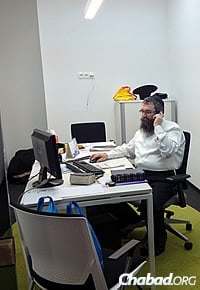
“When we left, there was already fighting, but it was mostly flying over our heads, not actually into our neighborhood,” Galia explains. “There was shooting, but we thought it would still get better. We were in Mariupol with only some vacation clothes and a few other small things; when my husband told me we couldn’t go back to Donetsk, not even for our clothing, I started crying.”
Since moving to Kiev at the end of August, Galia and her husband have struggled to gain a financial footing. Still, they are trying to acclimate, and with their son Mark, 12, happily registered at the Simcha School in Kiev, they plan on remaining in the city until at least the end of the school year.
“The children are happy here, thank G‑d,” says Galia. “But it’s not like they don’t know what’s going on over there. My 3-year-old daughter was on the phone with her grandmother [who lives in a village in the middle of the war zone] and she asks her, ‘Babushka, I want to come visit you. Are the guys still shooting?’ ”

Both Galia and Marina describe the joy they had when they learned that the Donetsk community was reorganizing in Kiev, and say that more than anything they were happy to see the familiar faces of the Vishedskis, in addition to friends and neighbors.
“We had a wonderful community, with an amazing Jewish school for our children, and a center where we could go for Shabbat and holidays,” says Galia, “and now it’s gone. We miss Donetsk very much; we just want to go home.”
Yet despite all they’ve gone through, Galia remains positive, saying that compared to others in Donetsk who have lost homes and loved ones, she considers herself to be among the lucky ones. “A classmate that I grew up with was in his home a few months ago when a shell landed and blew the whole thing up. His wife and children weren’t in the house, but he’s gone. Everybody in Donetsk knows someone who is now either dead or missing limbs.
“So we’re blessed here, all together in one piece,” she says. “My stove broke this morning, and I remembered what Dina told us just this Shabbos in synagogue—that we have to keep smiling and remain happy. When I spoke to her on the phone this morning and I told her what happened to the stove, she asked me, ‘Why are you so happy?’ So I answered, ‘That’s what you taught us!’ ”
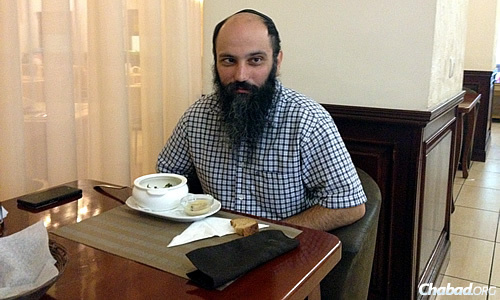
With no end to the turmoil in site, the future of Donetsk’s Jewish community, along with those of Lugansk and the teetering Mariupol, remains uncertain.
“We sit together and talk,” says Dina about the women of her community, “and everyone just has questions; nobody has any answers. People have homes, apartments, businesses in Donetsk; no one wants to just give it all up and run away.”
When asked what conditions are needed for him to return to Donetsk, Rabbi Vishedski says that in his eyes, it’s a matter of continuing his mission to work for the Jewish community of Donetsk, no matter what the circumstances.
“I see my shlichus here constantly changing,” he explains, as he and his wife finally end their day well past midnight. “When things started to get tense, my job was to try to calm people down, encourage them to do learn more Torah and do more mitzvot, to strengthen the community. When things got worse, I saw that I needed to encourage people to leave. It’s very difficult for a man to pick himself up and just go. To where? With what money? And that’s why I stayed there, to try to guide and help them make these difficult decisions.
“I was the chief rabbi of a large community—with 10 emissary families working in our organization—and now we are refugees. But each day brings with it its own task, and we must meet each challenge head on.”

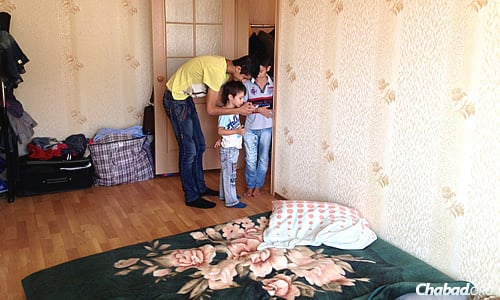

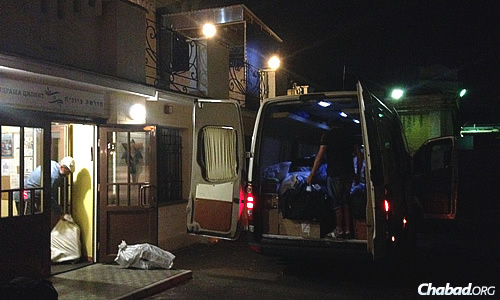


Join the Discussion